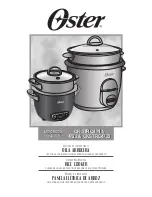
Hotplate
CAUTION: IF AT ANY TIME A CRACK IN THE
SURFACE BECOMES VISIBLE, DISCONNECT THE
APPLIANCE IMMEDIATELY FROM THE SUPPLY.
Under no circumstances should the hob be used
with aluminium foil in contact with the hob surface as
damage can occur.
The following boiling plates are located beneath the
decorative circular patterned cooking areas:-
Front left 6 heat: 1200W
Rear left 6 heat: 1700W
Rear right 6 heat: 1200W
Front right 6 heat: 1700W
The cooking areas change colour when heated
(become red) indicating which heating element is
switched on. The cooking area returns to its original
colour when the heating element is switched Off.
Off.
Off.
Off.
Off.
Warning:
Warning:
Warning:
Warning:
Warning: Even though the cooking area has
returned to its original colour it may still be hot.
The controls for the hotplates can be turned in either
direction.
Turn the control to 6 for fast cooking. To reduce the
heat to cook more slowly or simmer, turn the control
to a lower setting according to the size of the
saucepan and the amount of liquid.
Pans can be placed on the unheated areas of the
panel when cooking is finished and before serving
food. It is inadvisable at any time to leave a heating
element switched on without a pan in position as this
wastes energy, and could make soil or rub-off from
aluminium pans more difficult to remove. To protect
elements against over-heating, safety cut-outs have
been incorporated with each element. After several
minutes with the control at setting 6 the safety cut-
out switches the element Off
Off
Off
Off
Off and On
On
On
On
On continuously,
thus preventing any adverse effects that may be
caused by an excessive build-up of heat in the
cooking area.
Use of Hotplates
Note:
Note:
Note:
Note:
Note:
Under no circumstances should the hob be used
with aluminium foil in contact with the hob surface.
Turn the control to 6 for fast cooking. To cook more
slowly or simmer, turn the control to a lower setting
according to the size of the saucepan and the
amount of liquid. The two small Hotplates are
specially for smaller pans, low temperature cooking
and simmering.
Do Not
Do Not
Do Not
Do Not
Do Not leave a hotplate switched on without a pan
as this wastes energy and may shorten the life of
the hotplate.
CONTROL SETTINGS GUIDE
This is provided only as a guide – settings also
depend on the type of pan used and the quality of
food.
Safety requirements for deep fat frying
1. Use a deep pan, large enough to completely
cover the appropriate heating area.
2. Never fill the pan more than one-third full of oil.
3. Never leave oil or fat unattended during the
heating or cooking period.
4. Never try to fry too much food at a time,
especially frozen food. This only lowers the
temperature of the oil or fat too much, resulting in
greasy food.
5. Always dry food thoroughly before frying, and
lower it slowly into the hot oil or fat. Frozen foods,
in particular, will cause frothing and spitting, if
added to quickly.
6. Never heat fat, or fry, with a lid on the pan.
7. Keep the outside of the pan clean and free from
streaks of oil or fat.
Knob Position Type of food
1
To melt butter, chocolate, etc.
1 or 2
To heat food gently.
To keep small amounts of water simmering.
To heat sauces, containing egg yolks and butter.
To simmer: stews, meat, fish, vegetables, fruit.
3
To heat solid and liquid foods.
Keep water boiling.
Thaw frozen vegetables.
Make 2-3 egg omelettes.
4 or 5
To cook foods, just above simmering.
To maintain 'rolling' boil for preserve making.
5 or 6
To seal meat and fry fish.
6
Frying potatoes.
Bringing water to the boil.
Deep fat frying.
Dissolve sugar for preserve making.
EN
EN
7






































